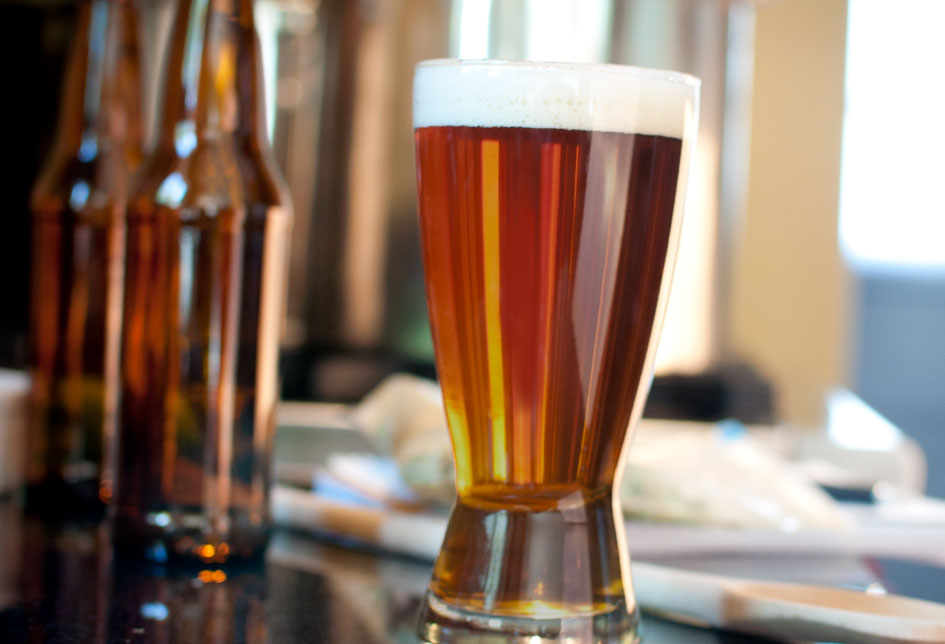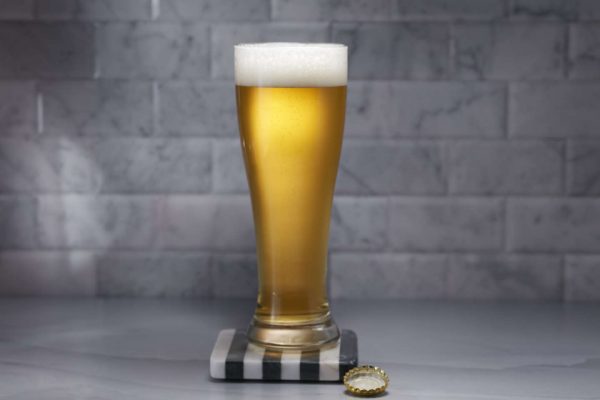
The following beer recipe is featured in the November/December 2011 issue of Zymurgy magazine. Access this issue along with the archives with Zymurgy Online!
Bock (German for goat) is likely a descendant of some of the oldest German lagers in the world. It evolved in the Franconia region of Germany, just north of modern day Bavaria. Bock has one of the largest ranges of the German beers and can be light (like a helles bock or maibock) to very dark; it can also be moderate to very strong in alcohol. A traditional bock is generally not hoppy, but more malt forward and brewed to at least a starting gravity of 1.064. We sat down with Larry Leinhart, owner and brewer at Prost Brewing Co. in Denver, Colorado to see how he brews his traditional bock. Prost Brewing Co. is a brewery that has made a name for itself as a lager brewery. Their brewhouse is a classic copper German two-vessel system built in 1963. This recipe was originally featured in the November/December 2011 issue of Zymurgy.
The following beer recipe is featured in the November/December 2011 issue of Zymurgy magazine. Access this issue along with the archives with Zymurgy Online!
Bock (German for goat) is likely a descendant of some of the oldest German lagers in the world. It evolved in the Franconia region of Germany, just north of modern day Bavaria. Bock has one of the largest ranges of the German beers and can be light (like a helles bock or maibock) to very dark; it can also be moderate to very strong in alcohol. A traditional bock is generally not hoppy, but more malt forward and brewed to at least a starting gravity of 1.064. We sat down with Larry Leinhart, owner and brewer at Prost Brewing Co. in Denver, Colorado to see how he brews his traditional bock. Prost Brewing Co. is a brewery that has made a name for itself as a lager brewery. Their brewhouse is a classic copper German two-vessel system built in 1963. This recipe was originally featured in the November/December 2011 issue of Zymurgy.
Ingredients:
- 8.6 lb. (3.9 kg) Munich II malt
- 3.6 lb. (1.6 kg) Munich I malt
- 1.15 oz. (33 g) Carafa® II malt
- 0.75 oz. (21 g) Tradition hops, 6.7% a.a. (70 min.)
- 0.3 oz. (8.5 g) Tradition hops, 6.7% a.a. (40 min.)
- 1.5 liter starter from a vial of White Labs WLP833 (German bock lager yeast)
Specifications:
Yield: 5 gallons (19 L)
Original Gravity: 1.068
Final Gravity: 1.012
ABV: 7.70%
IBU: 20
SRM: 20
Boil Time: 120 minutes
Directions:
Mashing Schedule: Combine malt with 4.5 gallons (17 L) of water at 148°F (65°C) for first rest at 122°F (50°C). Rest for 30 minutes. Raise the mash to 140°F (60°C) and rest for 30 minutes. Raise the mash to 158°F (70°C) and rest for 30 minutes. Raise mash to 170°F (76°C) and begin runoff. Boil: Collect 7.25 gallons preboil and boil for 120 minutes. Post-boil volume will be about 5 gallons (19 liters) with a vigorous boil. Ferment at 50°F (10°C) to terminal gravity (3.5°P, 1.012) and rack into a clean and sanitized carboy. Lager at 34°F (1°C) for 6–8 weeks. Prime with 3.3 oz. (94 g) of dried malt extract at 40°F (4°C) and bottle. Allow to sit at 65°F (18°C) for two weeks, chill, and drink!
Extract Version:
Substitute 9.5 lb. (4.31 kg) Munich malt extract syrup for Munch I and Munich II malts. Steep crushed Carafa II malt in 160°F (71°C) brewing water for 30 minutes, remove grains, and dissolve extract completely before proceeding with boil. Note that the boil may be shortened to 70 minutes, but the resulting beer may not be as complex as the all-grain version and may finish at a higher gravity, depending on the brand of Munich malt extract.



Share Post